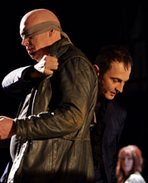SITE GUIDE
SEARCH
REVIEWS
REVIEW ARCHIVES
ADVERTISING AT CURTAINUP
FEATURES
NEWS
Etcetera and
Short Term Listings
LISTINGS
Broadway
Off-Broadway
NYC Restaurants
BOOKS and CDs
OTHER PLACES
Berkshires
London
California
New Jersey
DC
Connecticut
Philadelphia
Elsewhere
QUOTES
TKTS
PLAYWRIGHTS' ALBUMS
LETTERS TO EDITOR
FILM
LINKS
MISCELLANEOUS
Free Updates
Masthead
A CurtainUp Review
Orpheus X
By Elyse Sommer
|
You're not in love with her at all, you know. She's just a figure in a landscape. Just half a minute in your life, An accident, a simple accident. — a duet in which Jon tries to persuade his rock star client Orpheus to get on with his life and forget the stranger(Eurydice) who died in his arms. But Orpheus doesn't heed his advice, and sings Some things you can't erase. . . |

Rinde Eckert, John Kelly, and Suzan Hanson in Orpheus X
(Photo: T Charles Erickson) |
Orpheus X is not your typical play. In fact, typical is not an adjective one is ever likely to apply to any work by the multi-faceted Eckert. It has the feel of an opera, yet the small cast and orchestra (three actor-singers, including Eckert, and four musicians), the eclectic rhythms (part classical new music, part rock) and the use of face mikes don't exactly make for grand opera.
Like the last Eckert piece reviewed at Curtainup, And God Created Whales, (review), Orpheus X is a highly imaginative and experimental take on a much told tale. The Orpheus with the X is now an aging, guitar strumming rock musician who's locked himself into his recording studio. He's unable to work as he's fixated on the memory of Eurydice (Suzan Hanson), a poet who was run over by a taxi he was riding in and died in his arms. Despite his manager Jon's (John Kelly) pleas, Orpheus stops composing and singing.
In the meantime we see Eurydice in Hades where she is must let go of the symbols of her life (the pens, she wrote with and even the memories of the poems she wrote). She uses the chalk given her to replace her pens and symbolically referred to as "organized dust," to keep scribbling and filling up the walls with a jumble of what looks like Greek letters. Just as she is learning to let go of life, Orpheus pursues her to the underworld hoping to take her back to earth. True to the legend he is told this will be possible only if he remains blindfolded and doesn't look at Eurydice. In a twist on the better known outcome of this, Euridyce rips off the blindfold and opts for the after life where her art will presumably be preserved.
While Eckert is the nominal lead as the title character and indeed impresses with his acting and fine tenor voice, his two colleagues are equally stellar: Suzan Hanson brings a gorgeous voice and great beauty and feeling to Eurydice, the object of Orpheus's obsession; John Kelly handles his dual roles as Orpheus X's agent Jon and the eerie Persephone who prepares Eurydice for her place in Hades.
Ultimately, what makes this such a unique theatrical experience has less to do with the updated plot and the lyrical spoken and sung dialogue (some of the poetry is rather so-so) than the breathtaking, otherworldly beauty of Woodruff's production which gains much from Denise Marina's stunning video images and Christopher Akerlind's lighting. Words can't really do justice to the extraordinary imagery and atmosphere of this mesmerizing production. I therefore urge you who are adventurous enough to stray from the well-beaten theatrical path to see it for yourself
|
Orpheus X Written and composed by Rinde Eckert Directed by Robert Woodruff Cast:Rinde Eckert (Orpheus), Suzan Hanson (Eurydice) and John Kelly (John/Persephone) Video by Denise Marika Sets by David Zinn and Ms. Marika Costumes by Mr. Zinn Lighting by Christopher Akerlind Sound by David Remedios Musicians: Jeff Lieberman, Blake Newman, Timothy Feeney, Wendy Richman Stage Manager: Peter Dean Running time: 1 hour 30 minutes without intermission. Theater for a New Audience, at the Duke on 42nd Street, 229 West 42nd Street (646) 223-3010. From 12/02/09; opening 12/03/09; closing 12/20/09 Tuesday through Saturday at 8:00pm; matinees matinees Wednesdays and Saturdays at 2pm; Sundays at 3pm. Reviewed by Elyse Sommer 12/09/09 |
|
REVIEW FEEDBACK Highlight one of the responses below and click "copy" or"CTRL+C"
Paste the highlighted text into the subject line (CTRL+ V): Feel free to add detailed comments in the body of the email. . .also the names and emails of any friends to whom you'd like us to forward a copy of this review. You can also contact us at Curtainup at Facebook , Curtainup at Twitter and at our Blog Annex |
|
Subscribe to our FREE email updates with a note from editor Elyse Sommer about additions to the website -- with main page hot links to the latest features posted at our numerous locations. To subscribe,
E-mail: esommer@curtainup.comesommer@curtainup.com
put SUBSCRIBE CURTAINUP EMAIL UPDATE in the subject line and your full name and email address in the body of the message -- if you can spare a minute, tell us how you came to CurtainUp and from what part of the country. |






